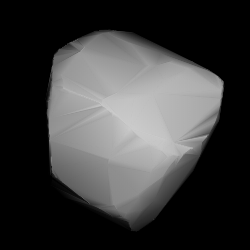425 Cornelia
Appearance
 Modelled shape of Cornelia from its lightcurve | |
| Discovery | |
|---|---|
| Discovered by | Auguste Charlois |
| Discovery date | 28 December 1896 |
| Designations | |
| (425) Cornelia | |
| Pronunciation | /kɔːrˈniːliə/[1] |
| 1896 DC | |
| Main belt | |
| Orbital characteristics[2] | |
| Epoch 31 July 2016 (JD 2457600.5) | |
| Uncertainty parameter 0 | |
| Observation arc | 115.49 yr (42183 d) |
| Aphelion | 3.05934 AU (457.671 Gm) |
| Perihelion | 2.71122 AU (405.593 Gm) |
| 2.88528 AU (431.632 Gm) | |
| Eccentricity | 0.060327 |
| 4.90 yr (1790.1 d) | |
| 65.7558° | |
| 0° 12m 3.978s / day | |
| Inclination | 4.04794° |
| 61.0718° | |
| 121.156° | |
| Physical characteristics | |
| Dimensions | 63.85±1.7 km |
| 17.505 h (0.7294 d) | |
| 0.0475±0.003 | |
| 9.7 | |
425 Cornelia is a large Main belt asteroid. It was discovered by Auguste Charlois on 28 December 1896 in Nice. It is named after Cornelia Africana.[3]
References
[edit]- ^ Noah Webster (1884) A Practical Dictionary of the English Language
- ^ "425 Cornelia (1896 DC)". JPL Small-Body Database. NASA/Jet Propulsion Laboratory. Archived from the original on 16 September 2020. Retrieved 10 May 2016.
- ^ Schmadel, Lutz D. (2003). Dictionary of Minor Planet Names – (425) Cornelia. Springer Berlin Heidelberg. p. 49. doi:10.1007/978-3-540-29925-7_426. ISBN 978-3-540-29925-7.
External links
[edit]- 425 Cornelia at AstDyS-2, Asteroids—Dynamic Site
- 425 Cornelia at the JPL Small-Body Database
